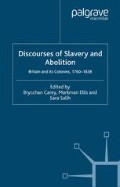Abstract
When Maria Edgeworth published her seemingly simple moral tale, ‘The Grateful Negro’ (1804), she introduced a text that critically engaged in an ongoing and contestatory conversation about the slave trade.1 ‘The Grateful Negro’ has evinced a variety of contradictory textual interpretations, even in discussions that make use of much of the same supporting material. George Boulukos, for example, has argued persuasively that Edgeworth was a ‘Iukewarm, ameliorationist supporter of slavery’.2 By contrast, I locate her firmly in the progressive, abolitionist camp. In this chapter, I examine the web of intertextual references that Edgeworth weaves throughout ‘The Grateful Negro’, references ranging from Bryan Edwards’s pro-slavery discourse to Aphra Behn’s protofeminist voice, and I argue that the tensions between these texts resist and subvert the notion that Edgeworth’s tale relies upon and contributes to discourses unambiguously supportive of slavery and the slave trade.
Access this chapter
Tax calculation will be finalised at checkout
Purchases are for personal use only
Preview
Unable to display preview. Download preview PDF.
Notes
Maria Edgeworth, ‘The Grateful Negro’, Popular Tales, 3 vols (London: J. Johnson, 1804), III, pp. 193–240. Subsequent references are to this edition of the text. Popular Tales was reprinted several times in the nineteenth century on both sides of the Atlantic. A new scholarly edition is forthcoming in: The Works ofMaria Edgeworth, 12 vols, ed. Marilyn Butler (London: Pickering and Chatto, forthcoming), XII.
George Boulukos, ‘Maria Edgeworth’s “Grateful Negro” and the Sentimental Argument for Slavery’, Eighteenth-Century Life, 23, 1 (February 1999), 12–29 (p. 22).
Anne Mellor, Romanticism and Gender (New York: Routledge, 1993), p. 80.
Marilyn Butler, Maria Edgeworth: A Literary Biography (Oxford: Clarendon Press, 1972), pp. 137–8.
Ibid., p. 9.
James Ward, British Westlndian Slavery, 1750–1834: The Process ofAmelioration (Oxford: Clarendon Press, 1988), p. 2.
Boulukos, ‘Sentimental Argument for Slavery’, p. 24. See also Andrew McCann, ‘Conjugal Love and the Enlightenment Subject: The Colonial Context of Non-Identity in Maria Edgeworth’s Belinda’, Novel, 30 (Fall 1996), 56–77 (p. 68); and Moira Ferguson, Subject to Others: British Women Writers and Colonial Slavety, 1670–1834 (New York: Routledge, 1992), p. 232.
Maria Edgeworth, ‘The Good Aunt’, Moral Tales for Young People, 2nd edn, 3 vols (London: J. Johnson, 1806), II, pp. 1–144.
Maria Edgeworth, Belinda (1801), ed. Kathryn J. Kirkpatrick (Oxford: Oxford University Press, 1994).
Thomas Day, The Dying Negro: A Poetical Epistle, Supposed to be written by a Black (Who lately shot himself on board a vessel in the river Thames;) to his intended Wife (London: W. Flexrrey, 1773).
Suvendrini Perera, Reaches of Empire: The English Novel from Edgeworth to Dickens (New York: Columbia University Press, 1991), p. 34.
Boulukos, ‘The Sentimental Argument for Slavery’, p. 17; Edgeworth, ‘The Grateful Negro’, p. 195.
Bryan Edwards, The History, Civil and Commercial, of the British West Indies, 2 vols (London: John Stockdale, 1793).
Edward Long, The History of Jamaica. Or, general survey of the antient and modern state of that island: with reflections on its situation, settlements, inhabitants…, 3 vols (London: T. Lowndes, 1774).
Bryan Edwards, The History, Civil and Commercial, of the British West Indies, 5 vols (New York: AMC Press, 1966), I, p. 21.
Ibid., p. 75.
Ibid., p. 89.
August Friedrich Ferdinand von Kotzebue, The Negro Slaves, a DramaticHistorical Piece, in Three Acts. Translated from the German of the President De Kotzebue (London: T. Cadell Jr and W. Davies, 1796).
Ferguson, p. 29; Aphra Behn, Oroonoko: or The Royal Negro, in The Norton Anthology of British Literature, 6th edn (New York: W. W. Norton, 1993), vol. 1, pp. 1866–1910.
Heidi Hutner, ‘Aphra Behn’s Oroonoko The Politics of Gender, Race, and Class’, in Living by the Pen: Early British Women Writers, ed. Dale Spender (New York: Teachers College Press, Columbia University, 1992), pp. 39–51.
A. G. Starr, ‘Aphra Behn and the Genealogy of the Man of Feeling’, Modern Philology, 87 (1990), 362–72 (p. 366).
Mary Vermillion, ‘Buried Heroism: Critiques of Female Authorship in Southerne’s Adaptation of Behn’s Oroonoko’, Restoration: Studies in English Literary Culture, 1660–1700, 16 (1992), 28–37.
Margarite Fernández Olmos and Lizabeth Paravisini-Gebert, ‘Religious Syncretism and Caribbean Culture’, in Sacred Possessions: Vodou, Santria, Obeah, and the Caribbean, ed. Margarite Fernández Olmos and Lizabeth Paravisini-Gebert (New Brunswick: Rutgers University Press, 1997), p. 6. For an excellent discussion of Obeah in this volume, see Alan Richardson, ‘Romantic Voodoo: Obeah and British Culture, 1797–1807’, pp. 171–94.
Julie Kristeva, About Chinese Women, trans. Anita Barrows, 1st pub. 1977 (New York: Marion Boyars, 1986), p. 35.
Ibid., p. 37.
Gilbert and Gubar somewhat reductively suggest that the figure of the wild, unethical, masculine woman in nineteenth-century literature dramatizes a self-division that demands that women authors simultaneously accept and reject patriarchal strictures (Sandra Gilbert and Susan Gubar, The Madwoman in the Attic: The Woman Writer and the Nineteenth-Century Imagination (New Haven: Yale University Press, 1979), p. 79).
Firdous Azim, The Colonial Rise of the Novel (New York: Routledge, 1992), p. 55.
Editor information
Editors and Affiliations
Copyright information
© 2004 Palgrave Macmillan, a division of Macmillan Publishers Limited
About this chapter
Cite this chapter
Botkin, F.R. (2004). Questioning the ‘Necessary Order of Things’: Maria Edgeworth’s ‘The Grateful Negro’, Plantation Slavery, and the Abolition of the Slave Trade. In: Carey, B., Ellis, M., Salih, S. (eds) Discourses of Slavery and Abolition. Palgrave Macmillan, London. https://doi.org/10.1057/9780230522602_13
Download citation
DOI: https://doi.org/10.1057/9780230522602_13
Publisher Name: Palgrave Macmillan, London
Print ISBN: 978-1-349-51281-2
Online ISBN: 978-0-230-52260-2
eBook Packages: Palgrave Literature & Performing Arts CollectionLiterature, Cultural and Media Studies (R0)

